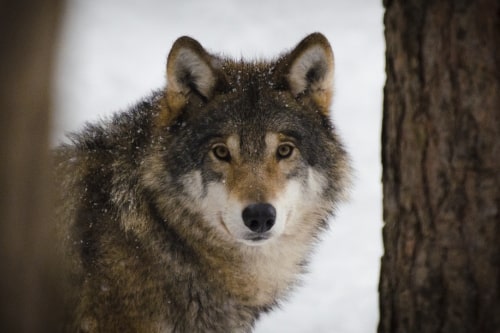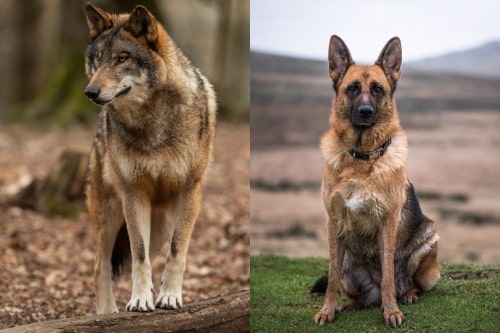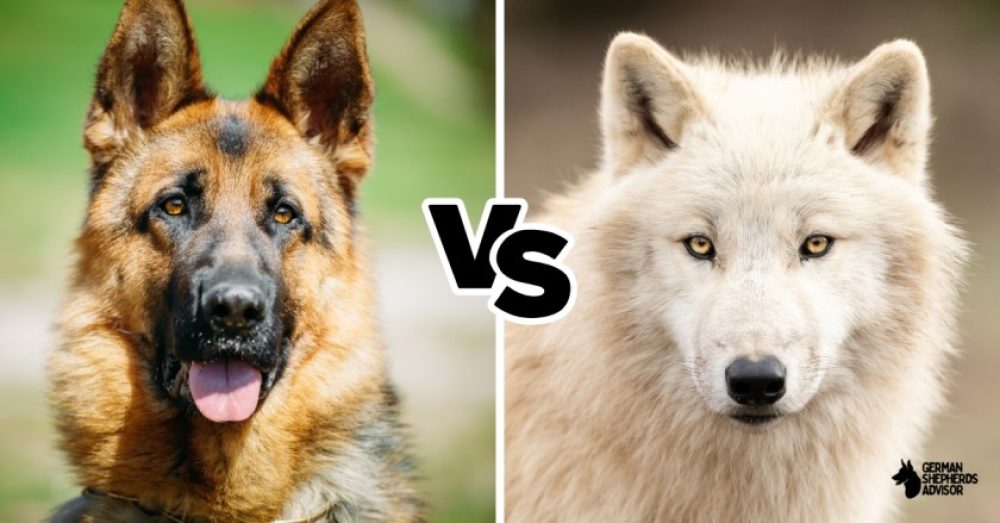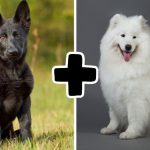what would happen if a german shepherd and a wolf faced off in battle? That question may seem silly to most, but it is one that animal trainers and dog owners alike have been pondering for years. This is especially true after many reports (and videos) of dogs and wolves both living together and even hunting together surfaced on the internet. The two animals do share some similarities which make this scenario very believable. They are both members of the canine family, they are about the same size, and they both produce similar sounds through barking or howling (although wolves can also communicate over long distances with whines, yelps, and growls). Plus, as noted previously, there have been several cases where dogs were found happily playing with a pack of wolves in the wild. So, would a German shepherd defeat a wolf? Or would the wolf outsmart and outmuscle his canine opponent?
This blog is doing us all a great service by keeping this important question alive. Please give them your support! German Shepherds vs Wolves: Who Would Win?
I’m about to get into some trouble here, but if we’re asking who would win between dogs and wolves then we should also be considering that other big canid: the coyote. If it’s fair to pit one kind of dog against another because they’re related and share basic similarities, then we should also consider all these other creatures which are significantly different from each other (we all know the coyote would lose to a wolf, but for this discussion we’re not considering that).
Assessment
I’m also going to assume that because this is a German Shepherd vs. Wolf matchup then we’re discussing weights of about 55lbs and higher. There are technically smaller German Shepherds out there, especially in Europe where they have standards allowing them to be as small as 45-50lbs (in America we’ve pretty much decided bigger is better) BUT realistically even though you can find one or two examples of these smaller ones weighing exactly 55lbs like their larger counterparts none of the average pet owners looking for protection and companionship will ever bother with such things (or perhaps more accurately: they won’t take the time required to find one of these dogs). **
I’m also going to assume for this article that we’re talking about a well-trained, properly raised German Shepherd vs. wolf – not a feral dog from the pound vs. a wild wolf from the forest. The influences of training and background on a dogs behavior should never be underestimated, especially when it comes to dogs bred specifically to protect their people!
Now what you all came here for:
A wolf’s bite pressure is between 1,200 and 1,500 lbs per square inch. That’s five times more powerful than a large dog like an American Pit Bull Terrier (250 lbs per square inch), 10x more powerful than the strongest dogs (German Shepherds at 225 lbs), and 30x more powerful than the average human bite pressure of 70lbs per square inch.

Last year there was a report that wolf bit into german shepherd neck bone.
German Shepherd vs Wolf – Animal Face-Off Subtitled HD added by Makeupdiva
Dogs have significantly less biting power due to the smaller size of their jaws, lack of upper body mass and lack of leverage. Wolves are much bigger with lots of strength for pulling things apart. German Shepherds are closer in size to wolves which is why over time they’ve done fairly well against them in fights. But if you put two equally matched dogs up against each other, regardless of breed, the one without an inherent advantage will probably lose. The German Shepherd was bred to defend and protect, while the wolf was bred to kill.
At this point in the video you can see that they’re trying to get around each other’s defense and muzzle strikes.
He does a good job of staying out of reach for most of it but gets tagged with a solid strike at the end.
This is interesting because dogs will typically try and bite at whatever target presents itself first rather than wait for their opponent to present them with one which is also something they don’t usually do in dog fights. It looks like he got hurt right before this part starts however because he was favoring his left side.
You can see that he’s trying to get away from the aggressor because he knows if he gets caught it’ll hurt pretty bad.
At this point, I think they’re both tired and thirsty which is going to affect performance a lot since they’re going back into a fight that they’ve already been in a few times now. They start circling each other again and then the wolf goes for a muzzle strike at 4:22. This is key because it shows you what his target priority will be as soon as he has an opening; muzzle strikes are typically done by dominant wolves or those near the top of the social order (alpha, beta, etc) because they’re used to attack dogs that are trying to mount them. He knocks the shepherd down at 4:33 and goes for a throat bite but gets stuck in the shoulder. The shepherd kicks back with his hind legs and manages to get away.
You can see at this point that he’s got some pretty significant damage done to the side of his face which means it could be fairly demoralizing for him as well because you can’t easily fight if you feel like you’re going blind on one side. At 5:12 you can see that he’s favoring his other front leg now too though so he might be getting tired since he hasn’t had much time to rest.
“What breed wolf is bigger than a German shepherd?”
“I have no idea how big they are!” I stammer back. He gives me an odd look then goes about his business checking my dog’s vitals, weight, etc.
My heart races as I worry that he thinks I’m ignorant to not even know how much my own pet weighs. Although this story seems innocent enough, it doesn’t make it any less embarrassing for me to come out of my veterinary visits knowing someone probably snickered or pitied me for being who knows what…a hood-nature dumb blond? Maybe they think I love animals more than people? Who knows! The point is now that I’ve crossed over to the dark side of studying to be a veterinarian, this embarrassing memory will never leave me.
As I recount this memory, I realize how important it is for veterinary care professionals to understand not only basic dog sizes but also breeds. During my years in veterinary school while learning about new dogs that were admitted into our facility, my classmates and professors would always ask each other “How big or small is that breed?” When you’re trying to come up with a treatment plan for an animal who’s breed maybe 25-75 pounds larger than your current patient or vice versa, knowing their normal size is crucial!

Why does dog size matter?
Dog size differences are especially important when determining things like which drugs can be used safely on animals of different sizes and how much anesthesia is needed for a dog breed or size. For example, the toxicity of some drugs such as acepromazine increases exponentially when the dose by weight goes up. Knowing if an animal patient has eaten chocolate before visiting can help your veterinary team determine what treatment might be necessary if the pet should happen to ingest any while on hospitalization or during their visit with you.
Some dogs breeds live longer than others and vice versa; it’s important to know that information as well since we want our pets to live long and healthy lives! Proper nutrition and exercise can play a crucial role in this regard (and I’m not talking about the Doberman who needs to run miles every day). Ask anyone who owns a basset hound- they tend to be overweight and have back problems.
Even differences in dog size can be important during surgery. Some dogs will need surgery sooner than others, for example, so knowing your patient’s normal weight is key! Dogs with different body shapes or conformations may also need surgery at different times since this plays a role in recovery time. Take the chihuahua for example; they are a very popular breed not only because of their small size but also because they make great purse accessories! Unfortunately, many people who purchase these animals don’t realize how fragile they can be especially when it comes to anesthesia and recovery times. These animals metabolize drugs much faster than other breeds causing slower recoveries from surgical procedures or anesthetic complications due to too deep of sedation.
In a nutshell..
The moral of the story is to remember that when you visit your veterinarian, they might be asking you about your pet’s size and weight for a variety of reasons. It helps them give your animal the best possible care! [ARTICLE END]
The information on this site is not intended or implied to be a substitute for professional medical advice, diagnosis, or treatment. All content, including text, graphics, images, and information, contained on or available through this website is for general information purposes only. The rabbits’ veterinarian has prescribed medications and specific diagnoses as well as any other important conditions that you should about! That all said if you have any questions, please do not hesitate to contact us. We are always available via phone or email to answer any questions that you may have. If you would like to see the buns’ veterinarian’s contact information, continue reading! Dr. Nichole Smith is a licensed veterinarian who has been practicing for over 8 years now. She graduated from Auburn University in 2009 with a Bachelors of Science degree in Pre-Veterinary Medicine and completed her Doctorate of Veterinary Medicine at Tuskegee University later that year before joining our rabbitry team as Dr. Jessica’s associate, she moved on from there after spending many great years here to start her own mobile veterinary service called Feathers & Fur Animal Hospital.
FAQS
Is a German Shepherd capable of defeating a wolf?
German Shepherds are unlikely to be able to kill wolves because they are much smaller and have a weaker bite force. Wolves have exceptionally sharp teeth, and a bite on the neck of an adult GSD can easily bring it down.
Is a German Shepherd the dog that comes closest to a wolf?
German Shepherds, like other domestic dogs, have a common progenitor in the wolf. However, because of the slender and rangy body, long legs, alert ears, and long nose of the German Shepherd dog, many people believe it is more closely linked to wolves than other dog breeds.







